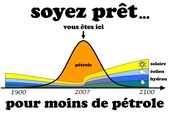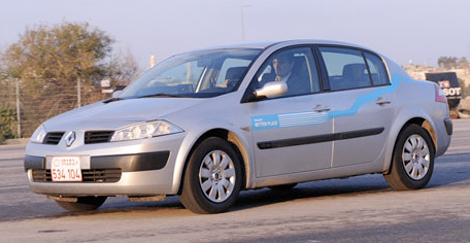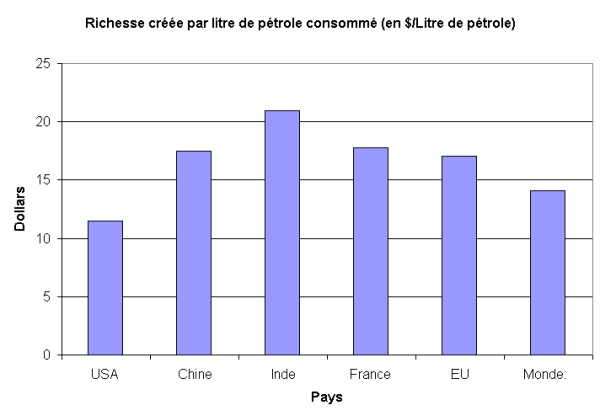Corrigendum,
How many m2 of solar panel do you need to power an electric vehicle fitted with batteries?
Useful energy for an electric vehicle: an electric vehicle close to the reference vehicle is equipped with approximately 300 kg of batteries (autonomy of the order of a good hundred km with lithium batteries) of batteries weighs approximately 1300 kg + 300 kg - 100 kg of engine (delta between diesel engine and electric motor) = 1500 kg. Therefore, we need about 15% more energy (see note C). The energy useful for moving such an electric vehicle then becomes = 83 MJ (notes A and B) x 1,15 = 95 MJ per cent
Energy to produce to complete 100 km = 95 MJ / 0,7 (note D) = 136 MJ per cent = 1,36 MJ / km
Usage hypothesis, energy required: for example 55 km / day (i.e. 20000 km per year if the user drives every day) requires the production of 1,36 MJ / km x 55 km = 75 MJ to be produced per day
Energy produced per m2 of solar panels: 225 kWh / year (this value seems rather high) = 810 MJ / year = 2,2 MJ / day (given by Christophe) (note E).
How many m2 of solar panel do you need to produce 75 MJ / day (55 km)?
At the rate of 2,2 MJ per m2 per day, we need 75MJ / 2,2MJ = 34 m2 of solar panels
See below the explanation (note F) of the 25m2 obtained by Christophe (the 2 results are correct)
Michel Kieffer (assisted by Christophe, thank you)
Note (for the brave who want to know where the above figures come from):
A - Reference vehicle: car with diesel engine, vehicle mass around 1300 kg:
• Data: assumption of average diesel engine consumption: 6,5 liters per cent; yield 35%; diesel density 0,85; diesel energy 43 MJ / kg; releases: 0,073 kg of CO2 per MJ of diesel fuel (3,16 kg / kg)
• Onboard energy to complete 100 km (U2) = 6,5 liters x0,85x43MJ = 237 MJ
B - Useful energy for the reference vehicle
Motor efficiency = 35% => 'useful energy for displacement = 237x0,35 = 83 MJ per hundred. These 83 MJs are used to accelerate the vehicle, to overcome aerodynamic resistance, rolling resistance and gradients. The rest, 154 GM, is lost.
C - Origin of the coefficient 1,15 above: this coefficient represents the additional power necessary to move 300 kg of batteries - 100 kg of engine (delta between diesel engine and electric motor) = +200 kg. Analogy with a classic car: the consumption of a car increases by around 0,5 liters per hundred per additional 100 kg. Consequence, this 200 kg overweight leads to an increase of 2x0,5 l / 100 = +1 liters per hundred or about + 15% (consumption base: 6,5 l), here is the origin of the coefficient 1,15 above .
D - Overall yield of the “solar production + static storage” x “mobile storage + engine” = 0,84x0,84 = around 70% or 0,7 (see Christophe hypothesis)
E - Energy and power units: see page BD “electricity and CO2” pages 20 21
http://cocyane.chez-alice.fr/pdf/electricite_et_co2.pdf
F - Explanation of the difference with Christophe's 25 m2: 25 m2 corresponds to Christophe's low assumption 0,2 kWh which corresponds for the diesel equivalent vehicle 5,7 liters of diesel per hundred (43 MJ / kg, density 0,85, diesel engine efficiency = 35%). The basis of my calculation is a little different: I started on a consumption of the reference vehicle = 6,5 l per cent plus 15% driven by the additional mass of the batteries. This gives us a ratio = 6,5x1,15 / 5,7 = 1,31; 1,31x25 = 33 m2… so it sticks!






